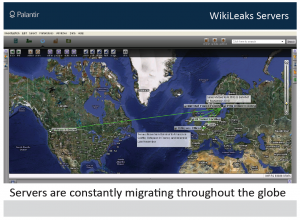War Gaming WikiLeaks–and the First Amendment
 At least according to this short piece, the US and Europe are holding a war game today to “simulat[e] how they would in future stop a Wikileaks-type hack.”
At least according to this short piece, the US and Europe are holding a war game today to “simulat[e] how they would in future stop a Wikileaks-type hack.”
I find this to be a really troublesome development. After all, the way to stop a “Wikileaks-type hack” is for DOD, by itself, to implement some very basic security measures on their networks. You know? Like preventing soldiers from inserting writable disks with a Lady Gaga label into SIPRNET-linked computers?
Granted, they have resisted such basic security measures for years, even in the face of two viruses and the WikiLeaks leak. But they don’t need the EU’s help to implement very basic security fixes.
Where they would need help from Europe, though, is in choking off a media outlet by denying it both funding and server space–something they tried to do with WikiLeaks, with only partial success. While they did succeed in choking off funding, they failed to prevent the publication of WikiLeaks generally.
Indeed, when DOJ was recommending Bank of America work with a private spying company to combat WikiLeaks, the plan was to go after WikiLeaks’ server in Sweden.
Need to get to the Swedish document submission server. Need to create doubt about their security and increase awareness that interaction with WikiLeaks will expose you.
Not only does this suggest DOD is still looking elsewhere to solve the problem created by their own abysmal network security.
But it also means the US and Europe are plotting out ways to shut down free speech in the future.

Is an attack by the gov’t of Country X against a civilian target inside Country Y an act of war by X against Y?
I ask because I believe that our Exec Branch has determined that cyber-attacks are acts of war.
I found the press release for this:
http://www.enisa.europa.eu/media/press-releases/first-joint-eu-us-cyber-security-exercise-conducted-today-3rd-nov.-2011
The Wikileaks connection seems to be a misunderstanding on the part of the journalist. The short description in the press release doesn’t sound like WikiLeaks at all.
As a follow-up, I would have described the two scenarios as defending against a Duqu-style attack and defending against a Stuxnet-style attack. That would have made for a much more interesting article and would be more accurate. Here’s the description (with my annotation in bold):
What we’re really doing is saying, “Um.. Sorry for showing everybody how to pull off these kind of attacks. Can we help show you how to defend against them?” Except we have no clue how to defend against them…
“plotting” is le mot juste here.
plotting out = determining/writing down a series of actions to be taken
plotting = scheming
p.s.
“first amendment” ?
where constitutional guarantees of individual freedom from gov’t zealousness are concerned,
our united states department of defense does not count below ten, ever.
for war, you see, is an all encompassing game, like american football, only bigger.
and like football in america these days,
any and all cheating is o.k. as long as it is our team cheating.
the idea, actually, the compulsion, is to win – whatever it takes…
Emptywheel wrote,
They, and all the other departments in government, might also consider sharing their information with citizens. Sort of like a democracy. That would be a pretty simple way of neutralizing Wikileaks.
Lee Hamilton to an unrepentant enemy of democracy,
Is this part of a concerted effort to stop a once and future Wiki-Leaks from disclosing legitimate state secrets or the expansion of programs designed to influence or ban more general discussions that someone in power considers inappropriate, however constipatedly a right wing ideologue, junta or politician might define that.
If they’re successful in “crushing” Wikileaks, various governments may find themselves in the same position as corporations that “crushed” Napster.
And if credit companies won’t work with Wikileaks, maybe people could send them… cash?